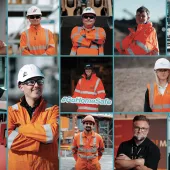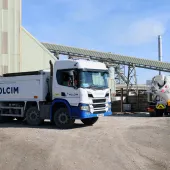Aggregate Industries call for focus on mental health

Company urges fellow construction firms to tackle mental health after success of its own campaign
AHEAD of Mental Health Awareness Week (14–20 May), Aggregate Industries are calling on construction companies to focus on mental health in the workplace after seeing the success their own programme has had on the company’s workforce.
According to the Health and Safety Executive, 31.2 million work days were lost due to illness in 2016/17, with 12.5 million of those due to stress, depression or anxiety experienced by employees.
Research has shown that construction workers are more susceptible to experiencing mental health problems, with the sector cited in the Government-commissioned independent review ‘Thrive at Work,’ as an industry in which male workers were 35% more likely to take their own lives.
Despite the facts, mental health is still an area that is taboo for many in the workplace. Stress, depression and anxiety are often overlooked and in some cases can be ignored by an employer. In an industry such as construction, it is common for workers to rarely talk about how they are feeling.
However, with increasing financial pressure on pension funds, the days of early retirements are long gone for the vast majority of people and so, as responsible employers, companies have to do everything they can to ensure people can stay ‘fitter for longer’.
Not only is it in the interests of the employee, it is also in the interest of employers, as absenteeism costs companies £8 billion a year, and ‘presenteeism’ – working whilst sick – can cause productivity loss, costing up to £26 billion every year.
It is for these reasons that in 2014 Aggregate Industries introduced ‘Healthy You’, an initiative to establish a greater connection with employees and help educate them on the benefits of a healthy lifestyle. As part of the scheme, the company runs awareness campaigns and talks on mindfulness.
Employees can also elect to take part in a mental health awareness course, run in partnership with Mental Health First Aid England. The three-hour intensive programme looks at how mental health is defined and considers how individuals can look after their own mental health and well-being.
It also aims to equip employees with the knowledge to provide support to colleagues and to better relate to people’s experiences.
Aggregate Industries have also provided managers across the business with training and information to help them identify the symptoms of depression and stress, and help to support employees exhibiting these types of issues by providing support to those affected.
According to Aggregate Industries, the commitment to focus on mental health has started to reap rewards for the company and its employees, as it has seen a year-on-year decrease in the number of absences related to mental health issues.
For example, in 2017, the number of different occasions of absence related to mental health issues in the company had decreased by 17%, compared with 2016. This meant there was also a reduction in the number of working days lost, which went down by 12% on the previous year.
Stephanie Kendrick, HR business partner and Healthy You lead at Aggregate Industries, commented: ‘Although many companies within the construction industry already have effective health and safety strategies, the emphasis is often centred on the physical side of it.
‘However, it is clear that there is a need for more focus to be placed on the health of the workforce, as demonstrated by the worrying industry statistics.’
Anna Cantwell, social value & sustainable procurement manager at Aggregate Industries, and Healthy You champion, added: ‘Getting employees to talk about mental health is not easy, especially in the construction sector. However, we have found that when staff are encouraged to talk openly with colleagues, in a workshop for example, they realize just how many people either suffer from issues themselves or know someone who does.
‘By making mental health and well-being a priority in the workplace, we are not only safeguarding the future of our employees, but also protecting the business.’









